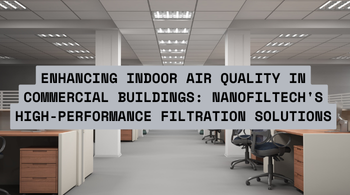International Jazz Day: Where Music and Clean Air Meet

Today, April 30, we celebrate International Jazz Day, a global initiative established by UNESCO in 2011 to honor jazz as a powerful force for peace, dialogue, and unity. Music is not only an artistic expression—it is a bridge that connects cultures and fosters understanding across borders.
But imagine listening to music in a space filled with polluted air and fine particulate matter—the experience would be far from inspiring. In venues like concert halls, recording studios, and music classrooms, air quality directly impacts sound clarity, performer health, and even the longevity of valuable instruments. Fine dust and airborne pollutants can damage expensive musical equipment, degrade sound systems, and pose serious health risks to musicians and audiences alike.
Why Air Quality Matters in Musical Spaces
Music requires more than creativity and skill—it also demands a clean, healthy environment. Airborne pollutants such as fine particulates, smoke, and harmful gases can impair breathing, cause fatigue, and lead to respiratory infections in performers. Dust buildup can clog sound systems, distorting audio clarity and quality.
Moreover, delicate instruments made from wood, strings, and metals are highly sensitive to air quality. Micro-particles, bacteria, and mold can infiltrate and damage their intricate structures, compromising sound quality and shortening their lifespan. Maintaining clean air is essential to protecting both musical performance and instrument preservation.



Advanced Air Purification for Music Environments
To safeguard air quality in musical spaces, many venues implement multi-stage air filtration systems that typically include:
- Primary Filters (G3–G4): Capturing larger particles like dust and hair.
- Medium Filters (F5–F7): Targeting smaller particles such as pollen and fine dust.
- HEPA Filters (H13–H14): Removing 99.95% of microscopic particles, ensuring clean air.
- Activated Carbon Layers: Absorbing odors and harmful gases.
- Antimicrobial Coatings: Inhibiting the growth of bacteria and mold.
These layered filtration solutions not only improve air quality but also extend the life of audio equipment, lower maintenance costs, and create a healthier environment for performers and audiences.
Nanofiltech: Bringing Clean Air to Musical Spaces

At Nanofiltech, we are committed to delivering advanced air filtration solutions to support healthy and vibrant musical environments. Our nanofiber-based filters offer significant advantages:
- High Filtration Efficiency: Capturing particles as small as 0.3 microns to ensure pure air.
- Energy Efficiency: Optimized designs that lower energy consumption and reduce operational costs.
- Extended Lifespan: High dust-holding capacity for longer service intervals and reduced maintenance.
- Eco-Friendly Materials: Using recyclable materials to support environmental sustainability.
Whether in concert halls, recording studios, music classrooms, or any setting that demands exceptional air quality, Nanofiltech filters provide the perfect solution. Our technology helps safeguard the health of performers, protect valuable instruments, and preserve the pure, rich sound of music.
On this International Jazz Day, let us celebrate the beauty of music—and commit to creating cleaner, healthier environments where every note can soar freely.
Choose Nanofiltech—because clean air is the silent partner of every beautiful melody.
 UPDATE
UPDATE
2025-06-24
Recent findings from a University College London (UCL) study have shed light on the long-term health effects of early exposure to air pollution. Drawing from data on over 9,000 children in the UK Millennium Cohort Study, researchers discovered that childr Read More2025-06-20
As global demand for data processing and cloud storage surges, data centers have become the backbone of the digital economy. However, maintaining stable operations requires more than just computing power — it depends on clean, reliable airflow. Read More2025-06-18
As urbanization accelerates, building envelopes become tighter, and environmental pollution intensifies, indoor air quality (IAQ) has garnered unprecedented attention. For offices, public institutions, and manufacturing facilities, improving air filtratio Read More2025-06-16
The world's water supply is becoming increasingly scarce, necessitating the development of innovative, cost-effective water filtration technologies. Electrospun nanofiber membranes are among the most promising alternatives due to their exceptional p Read MoreImmediately have your exclusive program customization




